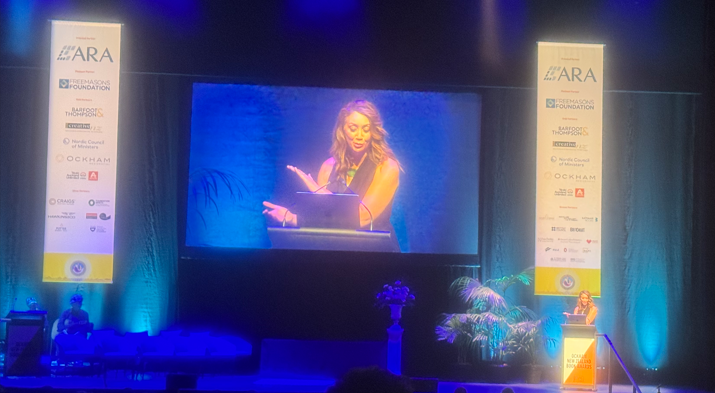By Juanita Nieuwoudt
The Ockham Book Awards are New Zealand’s premier literary awards and have been sponsored by property developer Ockham Residential since 2015. The awards are held every year in May as a lead-in to the Auckland Writers Festival.
My partner and I, as first-time attendees of the Auckland Writers Festival, were fortunate enough to attend the awards ceremony at the Aotea Centre in central Auckland where we joined a full house of over 2000 people at the Kiri Te Kanawa Theatre.
In a mihimihi, a representative of the Auckland hapū Ngāti Whātua Ōrākei warmly welcomed attendees and key political guests from the two leading parties.
Miriama Kamo was an eloquent and engaging MC for the evening. She provided meaningful descriptions of the works as they were announced and introduced the authors, who each read a selected passage from their work.

Caption: Miriama Kamo making sure that the event ticked along nicely. Photo by Peter McMillan
We heard from the Minister of the Arts, Paul Goldsmith, who was refreshingly brief but acknowledged (somewhat tongue-in-cheek) that some of the prize recipients in previous years have used the awards as an opportunity to share their views about government policy.
However, one of the most heartfelt comments in an introductory speech was by Mark Todd of Ockham Residential, the main sponsor of the event. He talked about a Steinbeck novel he had just read and then blurted out ‘F*** it’s good!’ showing us that we all quite instinctively know why books matter and how much joy we receive from engaging with them.
We kicked off the evening with the Mātātuhi Foundation Best First Book Awards. The Hubert Church Prize for Fiction went to Poorhara by Michelle Rahurahu (Ngāti Rahurahu, Ngāti Tahu–Ngāti Whaoa), published by Te Herenga Waka University Press.
The Jessie Mackay Prize for Poetry went to Manuali’i by Rex Letoa Paget (Samoan/Danish), published by Saufo’i Press.
Winner of the Judith Binney Prize for Illustrated Non-Fiction was Sight lines: women and art in Aotearoa by Kirsty Baker (Auckland University Press).
Winner of the E. H. McCormick Prize for General Non-Fiction was The chthonic cycle by Una Cruickshank (Te Herenga Waka University Press).
The Ockham awards were announced next. All short-listed writers came on stage and read a brief passage before exiting the stage, leaving it vacant for the winner. I mentally predicted winners and lo and behold! I was right three out of four times. (I am considering adding “literary awards prediction services” to my editing offerings.)
Winner of the General Non-Fiction Award was Hine Toa: a story of bravery (Harper Collins) by Ngāhuia te Awekōtuku (Te Arawa, Tūhoe, Ngāpuhi, Waikato), who beautifully read a section from her book that described some confrontational demonstrations against the Vietnam War, showing her political activism past.
While out and about the next day in central Auckland, we spotted Ngāhuia sitting in an ice cream shop. I was a bit shy to approach her in public in broad daylight (so to speak), but my partner nudged me to congratulate her on winning the award. She could not have been more gracious, even if it meant I interrupted her eating ice cream, mid-bite!
Winner of the Bookhub Award for Illustrated Non-Fiction was Toi Te Mana: an Indigenous history of Māori art (Auckland University Press).
Deidre Brown (Ngāpuhi, Ngāti Kahu) and Ngarino Ellis (Ngāpuhi, Ngāti Porou) have dedicated the book to the third writer, Jonathan Mane-Wheoki (Ngāpuhi, Te Aupōuri, Ngāti Kurī), who passed away in 2014. What a huge achievement it has been for them completing this magnum opus, which will no doubt become a reference text here and overseas.
Air New Zealand came in for some stick during the evening with poetry award sponsors and Wellingtonians Mary and Peter Biggs unable to arrive in Auckland because of flight interruptions. Richard Pamatatau, writer and Auckland University of Technology academic, was drafted in to present the poetry award to Emma Neale for her Liar, liar, lick, spit (Otago University Press). The venerable C. K. Stead’s recent publication was shortlisted, and he read several poems from In the half light of a dying day (Auckland University Press). We also heard readings by Richard von Sturmer and Robert Sullivan from their shortlisted works.
The star for the evening was undoubtedly Damien Wilkins, the winner of the Jann Medlicott Acorn Prize for Fiction for the novel Delirious (Te Herenga Waka University Press). Also affected by Air New Zealand disruptions, he timed his late entrance perfectly to maximise tension, with the entire house quite unsure if he would arrive at all. Miriama Kamo had hushed whispers with the support staff, and then there were loud cries of “Is Damien Wilkins in the house?”
But he arrived at the last moment and in his acceptance speech reminded us of his fellow shortlisted writers Maurice Gee and Dame Fiona Kidman 30 years ago when he won this very same prize for an earlier novel, The miserables.
We hope the $65,000 prize makes up for the negative royalty statements he received after writing for a decade, as he mentioned in his acceptance speech, before he thanked Jann Medlicott, publisher Fergus Barrowman, and editor extraordinaire Jane Parkin. The evening concluded with somewhat unexpected and loud streamer explosions and the packed crowd slowly made its way out to the foyer to purchase their favourites from The Women’s Bookshop. What a fun evening and wonderful start to the Auckland Writer Festival!

